This is a list of instruments used in general in laboratories, including:
Instrument list
| Instrument | Uses |
|---|---|
| Test tube | |
| Folin-Wu tube | |
| Glass slide mycole and cover slips | in microscopy, serology, etc. as the solid backing on which test samples are |
| Petri dish | used for preparation of culture media and the culture of organisms they are in |
| Glass beaker | reagent storage |
| Glass flask | gastric acid, or other fluid titration |
| Pasteur pipette | for aspiration and addition of reagents |
| Graduated pipettes | for aspiration and addition of reagents, often of minuscule amounts of the material; used mainly in colorimetry |
| Syringes | |
| Disposable gloves | prevention of transmission of diseases (as long as not cut or perforated) to or from the user |
| Tourniquet | This is used to cause an artificial venous stasis by applying pressure through this rubber tube. This leads to engorgement of the veins, allowing them to be seen more easily. Used for intravenous injections and cannulation. |
| Microscope | used for visualising minute structures, including microbes |
| Bunsen burner or spirit lamps or candles | source of fire / heat |
| Ultracentrifuge | used to separate particles dispersed in a liquid according to their molecular mass |
| Electrophoresis apparatus | used to detect and classify serum proteins or proteins from any other source; also used for DNA separation |
| Chromatography: | |
| • Gas chromatography or Gas liquid chromatography (GLC) | |
| • Planar chromatography | |
| • Paper chromatography | |
| • Thin layer chromatography | |
| • Affinity chromatography | |
| • Ion exchange chromatography | |
| • Size exclusion chromatography | |
| • Countercurrent chromatography | |
| • Countercurrent chromatography | |
| • Hematology analyzer | It is simply known as Cell Counter. |
| • Semiauto analyzer | |
| • Reflotron | |
| Setup for radioimmunoassay or RIA | Previously this was widely used to detect various things in bold fluids like proteins (natural, infective, those produced by the body in reaction to disease, or cancer related), tumor markers, hormones, viruses (hepatitis, or HIV), etc. |
| Setup for enzyme linked immunosorbant assay (ELISA) | It is presently widely used to detect various things in bold fluids like proteins (natural, infective, those produced by the body in reaction to disease, or cancer related), tumor markers, hormones, viruses (hepatitis, HIV), etc. It has replaced RIA. |
| Colorimeter | used in photochemical analysis and quantitative estimation of substances such as blood sugar, creatinine, and hemoglobin. |
| Burette | used to measure the amount of acid or alkali used in titration |
| General laboratory stands, racks, filter paper, reagents, etc. | |
| Induction coils | as a source of high voltage electricity |
| Cathode ray oscilloscope | ' |
| Recording kymograph | historically, used in human or animal experiments to measure and record data |
| Long extension kymograph | historically, used in or human animal experiments to measure and record data |
| Surface plasmon resonance | Label-free detection of molecule binding. Used to determine kinetic constants of the interaction (ka, kd, KD). Can also be used for thermodynamic analysis. |
Image gallery
 Test tubes in racks
Test tubes in racks Beaker
Beaker Burette
Burette A cuvette of a colorimeter
A cuvette of a colorimeter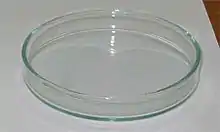 Petri dish
Petri dish
 Dispensable pipettes
Dispensable pipettes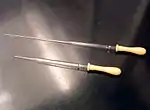 Glass Pasteur pipettes with teats
Glass Pasteur pipettes with teats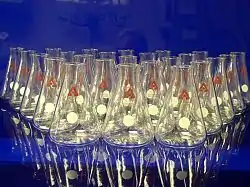 Flasks
Flasks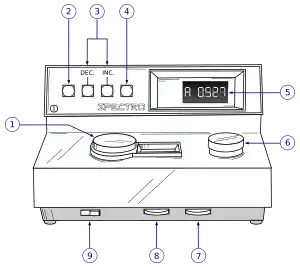 Colorimeter (spectrophotometer)
Colorimeter (spectrophotometer)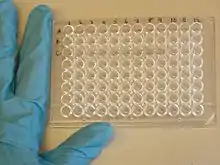 Microtiter plates
Microtiter plates Antique light microscope
Antique light microscope Gel electrophoresis apparatus
Gel electrophoresis apparatus High-speed centrifuge
High-speed centrifuge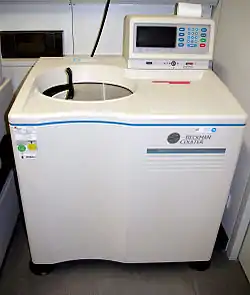 Ultracentrifuge
Ultracentrifuge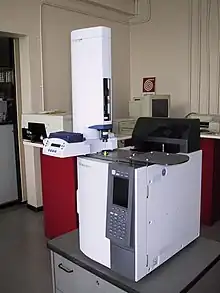 Gaschromatograph
Gaschromatograph
References
This article is issued from Wikipedia. The text is licensed under Creative Commons - Attribution - Sharealike. Additional terms may apply for the media files.